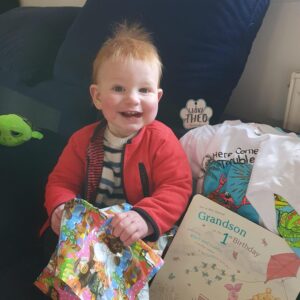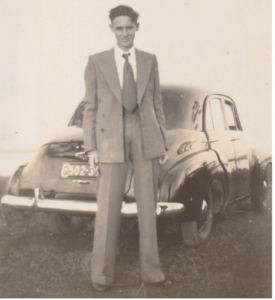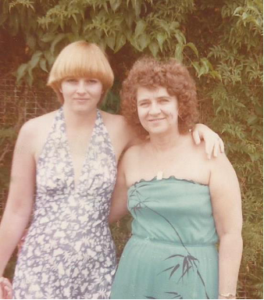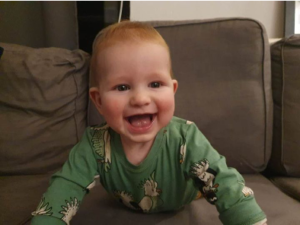Does researching our family history change us? How do we want to be remembered?

Theo on his 1st birthday.
Yes, folks it is my turn again as guest blogger. As usual I am sitting here clueless. What do people want to know, learn or simply read.
In May I was one of the guest speakers on the Life Matters program hosted by Hilary Harper on Radio ABC. Also being interviewed was Jenny Brockie, one of the latest celebrities on the new Australian season of Who Do You Think You Are on the SBS on Tuesday nights. The phone lines were also open to the public and the ‘switchboard’ lit up.
The topic was along the lines of ‘does researching family history change who you are’. The short answer is yes, it certainly can. Jenny talked about the whole WDYTYA experience and how they are kept ‘in a bubble’ with each new discovery revealed live on the program. So, she wasn’t sure what to expect.
I gave the example of taking a DNA test in 2015 only to find that granddad was not Dad’s biological father. That certainly changed my life after having researched my Norwegian ancestors for over almost 40 years back then. Gone was any Viking heritage and all that was left was a blank quarter of my family tree.

Dad and his black FJ Holden, we had so many Sunday drives in this car.
Not surprisingly most of the telephone responses were also along the lines of having been adopted and not told, or having relatives placed in institutions and never spoken of again, or finding out that your sister was really your mother. It was obvious that lots of people have had their lives changed by researching their family history and discovering family secrets.
As you sit there and read this, think about how your life has been changed/impacted/improved by doing your own family history. There is always the good, the bad and the ordinary in everyone’s family story. We also need to keep in mind that society has changed so much over the years and what was once shameful, is not so now.
Despite my DNA shock, I have to say that family history has become my life since 1977 when I first watched Roots with my then husband. We both decided to see what we could find out and became so involved that my husband became Treasurer of the newly established Genealogical Society of Queensland.
It led to a career change for me, and I ended up working at the John Oxley Library and the State Library of Queensland and the Queensland State Archives. I even moved to Canberra to work in the National Archives of Australia and on to Melbourne to work at the Public Record Office Victoria. Finally, I set up my own business in 2009. Family history changed my life!

Mother and daughter about 1975.
Most of that background, and more, is public record on my website, in blog posts (see my last guest post in November 2022) and in talks I have done over the years/decades. I was somewhat shocked then when Hilary asked me what would I think if my little grandson started looking into my life in the future? My first response was ‘he won’t have to as I have already done it’.
But then Hilary said, ‘what about my own life’? I started to wonder what my grandson would think of my three marriages, my personal beliefs, my lifestyle and even my testy relationship with my mother.
No doubt my grandson will be a whiz on social media and be able to pull up all kinds of information that I have posted since 2009, my entry into the world of Facebook, Twitter and whatever else has come along since then. Who knows what the technology will be in 20 years when he turns 21?
I have always said I want to write my own eulogy because I’m the only one that really knows my life and my reasons for making various major life changes. I want to control how I am remembered. That’s probably the project manager in me wanting to do things properly and timely.

My grandson was so excited to see me in December; they live in Sweden, and I wanted a white Christmas.
Do people write their own eulogies? Or do we leave our family to scramble around trying to write something from memory? I put together a PowerPoint show for Mum’s passing, but there was no funeral as it was Covid times. Just immediate family, no more than 10 people. My brother wrote some words as he was closest to Mum over the years.
What do I want when the time comes? I really don’t know but hopefully you will find my eulogy on my website.
My final thoughts are that family history has given me so many wonderful colleagues and friends from all over Australia, New Zealand and the UK and USA. They have all helped me to grow and learn as we trace our own family histories. Yes, researching family history does change lives and mine has certainly been enriched over the decades. Thank you all and remember, tell your own story too!

Great post Shauna! I can’t imagine what my life would have been like without family history research. It’s given my reprieve in times of stress and work demands, clues to dysfunctional family matters, an understanding (to some extent) of those who came before, and an excuse to travel to see ancestral places.
I won’t be writing my own eulogy…tempting as it is…but will leave that to the family. They may not know why I’ve made some decisions or taken certain life actions, but then it sometimes seems a mystery to me too 🙂
Thanks for your comment Pauleen. Yes it has helped me to understand underlying tensions in the family growing up and I certainly love the travel aspect of seeing where they lived.
I loved reading this Shauna. Like you, I would prefer to write my own eulogy. I’m the only one who knows my story and I’d like it to be true. I can’t imagine my life without family history. Decades ago when I thought I’d try to find out the names of my Dad’s parents, I had no idea of the impact that would have on my life.
Thanks Jennifer. Yes what would we have done without family history in our lives. Would I have learnt to knit?
Finding out that I was adopted when I was 52 meant that my life had no foundation. Researching my birth family means I have a new foundation and I know who I am. It has been so therapeutic.
Hi Di thanks for your comment. I’m glad that you have been able to identify your birth family and research where you are from. I found discovering Dad’s father therapeutic and it explained a lot.